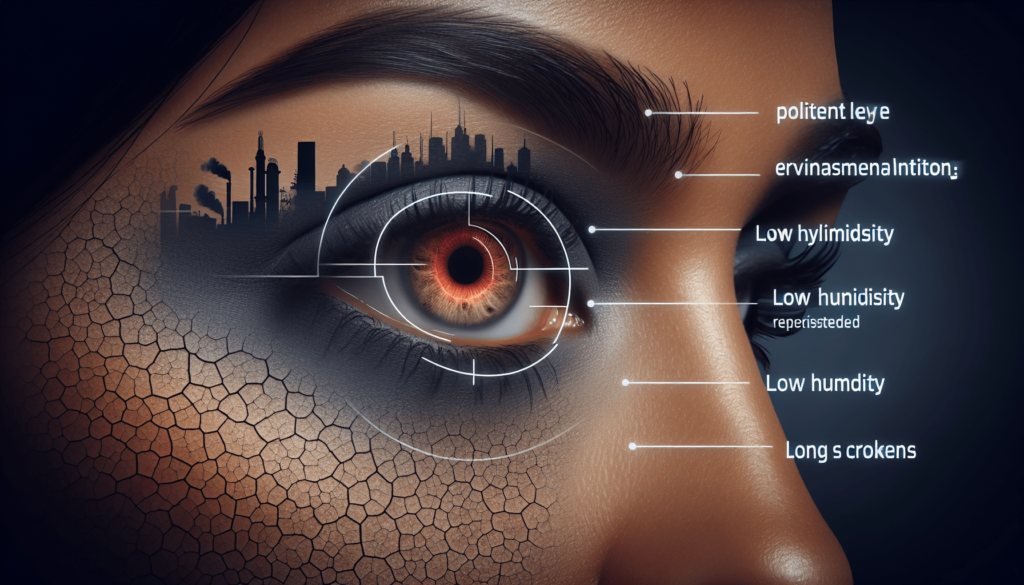Hello there! Have you ever wondered if the makeup you wear could be causing dry eye problems? It’s a common concern among makeup enthusiasts and beauty lovers alike. In this article, we’ll explore the potential impact of wearing makeup on your eye health and provide some tips on how to prevent dry eye issues while still looking fabulous. Let’s delve into the world of cosmetics and eye health together!
Can Wearing Makeup Contribute To Dry Eye Problems?
Have you ever experienced irritated, dry, or watery eyes after a long day of wearing makeup? You may be wondering if your cosmetics could be contributing to your dry eye symptoms. Let’s explore the relationship between makeup and dry eyes to help you understand how to minimize the impact on your eye health.
What is Dry Eye Syndrome?
Dry eye syndrome occurs when your eyes do not produce enough tears or when the quality of your tears is poor, leading to discomfort and potential damage to the surface of your eyes. Symptoms can include dryness, redness, irritation, a gritty feeling, and excessive tearing as your eyes try to compensate for the lack of moisture.
If you experience any of these symptoms regularly, you should consult with an eye care professional to determine the underlying cause of your dry eye issues.
Symptoms of Dry Eye Syndrome
Dry eye syndrome can manifest in various ways, ranging from mild discomfort to severe pain and vision problems. Common symptoms of dry eyes include:
- Dryness
- Stinging or burning sensation
- Redness
- Grittiness or feeling like there is something in your eye
- Excessive tearing
- Sensitivity to light
- Blurred vision
- Eye fatigue
If you are experiencing any of these symptoms, it is essential to seek proper medical advice to address the root cause of your dry eye problems.
How Does Makeup Affect Your Eyes?
Makeup, particularly eye makeup, can contribute to dry eye problems in several ways. Ingredients in cosmetics, improper application techniques, and poor makeup hygiene can all impact the health of your eyes and exacerbate dry eye symptoms.
Ingredients in Makeup
Some cosmetic products contain ingredients that can irritate the delicate tissues around your eyes, leading to dryness and discomfort. Common irritants found in makeup include:
- Fragrances
- Preservatives
- Dyes
- Harsh chemicals
- Allergens
If you have sensitive eyes or are prone to dryness, it is essential to choose makeup products that are hypoallergenic, fragrance-free, and gentle on the eyes.
Makeup Application Techniques
The way you apply makeup can also affect your eye health. Using expired or contaminated makeup, sharing cosmetics with others, and improper removal of makeup can introduce bacteria and irritants to your eyes, leading to inflammation and dryness.
Make sure to follow proper hygiene practices when using makeup, such as washing your hands before application, cleaning your makeup brushes regularly, and removing makeup before bed to prevent eye irritation.
Poor Makeup Hygiene
Neglecting to clean your makeup tools, such as brushes, sponges, and eyelash curlers, can introduce bacteria and dirt to your eyes, leading to infections and dry eye symptoms. Additionally, using expired or contaminated makeup products can cause irritation and inflammation in the delicate tissues around your eyes.
To prevent makeup-related eye issues, make sure to clean your makeup tools regularly, replace expired products, and avoid sharing cosmetics with others to maintain eye hygiene.
Tips for Preventing Makeup-Related Dry Eye Problems
While wearing makeup can be enjoyable and enhance your appearance, it is essential to prioritize the health of your eyes. Here are some tips to help prevent makeup-related dry eye problems and maintain optimal eye health:
Choose High-Quality, Hypoallergenic Makeup Products
When shopping for makeup, opt for high-quality products that are hypoallergenic, fragrance-free, and formulated for sensitive eyes. Look for cosmetics that are labeled as ophthalmologist-tested to ensure they are safe for use around your eyes.
Remove Makeup Before Bed
To prevent eye irritation and dryness, always remove your makeup before going to bed. Use a gentle makeup remover or micellar water to cleanse your skin and eyes thoroughly, avoiding harsh rubbing or tugging on the delicate eye area.
Clean Your Makeup Tools Regularly
Makeup brushes, sponges, and other tools can harbor bacteria and dirt if not cleaned regularly. To prevent contamination and potential eye infections, wash your makeup tools with mild soap and water weekly and allow them to dry completely before use.
Avoid Waterproof Makeup
Waterproof mascara, eyeliner, and eyeshadow can be challenging to remove and may require harsh rubbing, leading to eye irritation and dryness. Opt for non-waterproof formulas that are easier to cleanse and gentler on your eyes.
Practice Good Makeup Hygiene
Maintain good hygiene practices when using and storing your makeup products. Avoid sharing cosmetics with others, wash your hands before application, and discard expired or contaminated products to reduce the risk of eye irritation and infections.
Take Breaks From Makeup
Give your eyes a break from makeup occasionally to allow them to breathe and recover. Going makeup-free for a day or two each week can help reduce the risk of eye irritation and dryness caused by cosmetic products.
Stay Hydrated
Drinking an adequate amount of water daily can help keep your eyes hydrated and prevent dryness. Aim to drink at least eight glasses of water per day to maintain optimal eye health and overall well-being.
Conclusion
In conclusion, while wearing makeup can enhance your appearance and boost your confidence, it is essential to be mindful of how cosmetics can impact your eye health. By choosing high-quality, hypoallergenic makeup products, practicing good makeup hygiene, and following proper application techniques, you can minimize the risk of dry eye problems associated with wearing makeup.
If you experience persistent dry eye symptoms despite taking preventive measures, it is crucial to consult with an eye care professional for a comprehensive eye examination and personalized treatment plan. Remember to prioritize the health of your eyes and make informed decisions when it comes to makeup to maintain optimal eye health for years to come.


